Dark Fiction Roundtable
One Hot Topic...Multiple Takes by Today's Hottest Talents
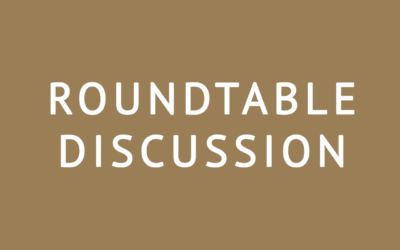
Horror Bloggers United: A Roundtable with The League of Tana Tea Drinkers
By, Vince A. Liaguno
Blogging has become something of a pop culture phenomenon. It’s a virtual platform that gives everyone – from novice to novelist – a unique voice and presence on the vast World Wide Web. The ultimate in self-publishing, upgraded for the 21st century.
But like the virtual social networks that bring people from around the world together, it seems like a natural progression then that bloggers would branch out from their individual self-expression and seek group affiliation. In the horror arena, a group of stalwart bloggers joined forces earlier this year to form 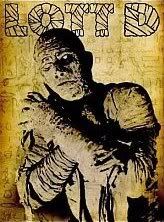 the peculiarly named League of Tana Tea Drinkers (or LOTT D). The brainchild of John Cozzoli, who has helmed his own long-running blog called ZOMBOS CLOSET OF HORROR which explores the horror genre as reflected in all media and pop culture, LOTT D now includes 29 member blogs and continues to grow. Impressive in its variety, the LOTT D boasts member blogs covering everything from Frankenstein to Godzilla, slasher films to zombies, and childhood terrors to comic books. Spend a few hours perusing the LOTT D’s member blogs and you’ll find everything you need for a serious horror fix — from serious film commentary to some of the funniest genre observations, insightful original essays to button-pushing opinion pieces, and heaps of useful book and films reviews from classic to current.
the peculiarly named League of Tana Tea Drinkers (or LOTT D). The brainchild of John Cozzoli, who has helmed his own long-running blog called ZOMBOS CLOSET OF HORROR which explores the horror genre as reflected in all media and pop culture, LOTT D now includes 29 member blogs and continues to grow. Impressive in its variety, the LOTT D boasts member blogs covering everything from Frankenstein to Godzilla, slasher films to zombies, and childhood terrors to comic books. Spend a few hours perusing the LOTT D’s member blogs and you’ll find everything you need for a serious horror fix — from serious film commentary to some of the funniest genre observations, insightful original essays to button-pushing opinion pieces, and heaps of useful book and films reviews from classic to current.
The mission of the LOTT D is outlined on its virtual homepage:
"Our mission is to acknowledge, foster, and support thoughtful, articulate, and creative blogs built on an appreciation of the horror and sci-horror genre. Horror bloggers are a unique group of devoted fans and professionals, from all walks of life, who keep the horror genre, in all its permutations and media outlets, alive and kicking. Often spending long hours to keep their blogs informative and fun, horror bloggers share their unique mix of personality, culture and knowledge freely to fans of a genre difficult to describe, but easy to love."
DSM recently caught up with Cozzoli (aka ILoz Zoc) and five of his LOTT D compatriots for an informal discussion about this groundbreaking new consortium of horror bloggers. Joining him are Stacie Ponder, FINAL GIRL proprietress and AMC columnist extraordinaire, Lance Vaughan (aka Unkle Lancifer), co-creator of the childhood terror site KINDERTRAUMA, August Ragone , author and renowned authority on Japanese film and culture who helms THE GOOD, THE BAD, AND GODZILLA, John Morehead, academic and explorer of the social, cultural, mythic, archetypal, imaginative, creative, and even spiritual aspects of the fantastic at his blog THEOFANTASTIQUE, and Mike Petrucelli (aka Pax Romano), witty commentator on the queer subtext of horror films from BILLY LOVES STU.
Dark Scribe Magazine: Welcome, LOTT D’ers. Tell our readers about your individual blogs.
John Cozzoli: ZOMBOS CLOSET OF HORROR is my cheeky way of reviewing horror-related movies, books, and other terror-filled sundries that hold my attention, as well as bridging relationships with the creative people behind the genre that gives us those cozy goose bumps erupting from safe-- I’m not the victim, you are-- frights. To spice things up, I often use a fictional framing device for my reviews and interviews to involve the quirky characters living in the Zombos mansion and the odd situations they often find themselves in.
We interrupt this answer for an important bulletin…By the way, something I’ve never mentioned before: Zombos is pronounced with a short “O” sound (like boss) not long “O” (like doze). This is the reason I don’t add the possessive in the title; if I wrote it as Zombos’ Closet of Horror, the long “O” pronunciation would be a natural tendency. And Zombos’s Closet of Horror would rhyme with thrombosis, I think, so I’ve left that out, too. Now back to our regularly scheduled answer…
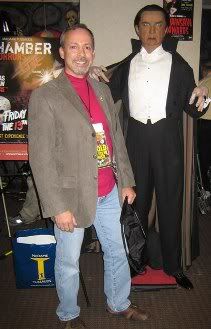 My blogging alter ego is ILoz Zoc, long-suffering valet to Zombos, the aging and decaying B actor of many C horror films. All of this is my attempt at instilling a horror host sensibility into my blog to make it more than just straightforward reviews and views. I’ll often break with blog format (and common sense) and do things like a multi-part story interspersed with reviews, something the blog’s forward-moving format is not very amenable to, or place an interviewee into a bit of fiction before the questions commence. The impish part of me loves doing that especially. One of my favorites is when I locked director Lance Weiler (The Last Broadcast) in Zombos’s immense closet and wouldn’t let him out until he answered some questions. Jonathan Maberry (Pine Deep Trilogy) was a good sport, too, when I rubbed two pencils together and had him appear in a bathrobe for an interview.
My blogging alter ego is ILoz Zoc, long-suffering valet to Zombos, the aging and decaying B actor of many C horror films. All of this is my attempt at instilling a horror host sensibility into my blog to make it more than just straightforward reviews and views. I’ll often break with blog format (and common sense) and do things like a multi-part story interspersed with reviews, something the blog’s forward-moving format is not very amenable to, or place an interviewee into a bit of fiction before the questions commence. The impish part of me loves doing that especially. One of my favorites is when I locked director Lance Weiler (The Last Broadcast) in Zombos’s immense closet and wouldn’t let him out until he answered some questions. Jonathan Maberry (Pine Deep Trilogy) was a good sport, too, when I rubbed two pencils together and had him appear in a bathrobe for an interview.
Why a closet? Closets are such wonderful places to hang out in. Growing up, I stored my comic book collection in my closet, did escapes (straight jacketed and chained to chair) in friends’ closets — I am an amateur magician and escape artist — and, here’s where it gets really weird, would read my copies of Famous Monsters of Filmland by flashlight late at night in my closet. For some reason, buried deep down in my psyche, my childhood closet was a secure and fun place to be. Closets are also a perfect metaphor for all those bumps in the night things the horror genre entails.
Why Zombos? The name was inspired by The Munsters episode where Eddie gets to meet his favorite horror host, Zombo. I didn’t want to rip off the name exactly, so I added the “s.”
Stacie Ponder: I started FINAL GIRL in June 2005 when the horror blogosphere was still relatively small. I opted to concentrate on slasher films (mostly from the 70s and 80s) since no one else was really doing that and I’m fairly knowledgeable about them. After a while, though, I wanted to review and post about other types of horror movies- haunted house flicks, animals run amok movies, whatever- so I branched out from slashers and I’ve been a simple “horror blog” ever since. Slashers still get most of my attention, though.
Lance Vaughan: Originally we imagined KINDERTRAUMA as a place where people could discuss the movies and television shows that first scared them as children. We've branched out to include just about everything under the sun that might traumatize a child. It's something we all naturally have in common. We were all once children and, at some point, we were all scared by something. It's particularly interesting to hear these tales from horror fans because these scares have inspired a lifelong commitment. In addition, we explore children's place within the genre itself both as heroes and villains.
August Ragone: There is no real hard focus with THE GOOD, THE BAD, AND GODZILLA, per se, except to serve as a sounding board for genre topics that interest me—be it Japanese fantasy films and television, and other monstrous things near and dear to my heart (and there are a lot of them). I don’t want to be tagged as solely a Japanese genre blog, and I hope that people will eventually realize that. I thought that the title, while a riff on Serio Leone’s The Good, The Bad, and the Ugly, would express that while I would be writing about Japanese monster movies, would also be a spotlight for the I would be spotlight the best and worst of what I like—but not all of my vices (I have to keep some secrets, don’t I?).
John Morehead: First, let me say thanks for this opportunity to talk about my work with your readers. As an outgrowth of my academic work at a graduate level in intercultural and religious studies a couple of years ago I decided to put together THEOFANTASTIQUE as a blog or website that would bring together my interest in the fantastic as a fan coupled with my desires to explore the fantastic in deeper ways as a scholar. The result is I think unique, in that I post commentary as a life-long fan of horror, sci-fi, and fantasy, yet I also tap into the growing body of academic literature on these things for both my commentary and interviews so that readers can appreciate the multiple interpretations and layers of meaning they present. I am fascinated by not only the sense of awe, imagination, mysteriousness, and fear these things bring out in us, but also in what our interest in these things tell us about ourselves and our culture, our hopes and fears as well as our interest in myth, archetype, and even the religious or spiritual.
Mike Petrucelli: My blog, BILLY LOVES STU, is nothing more than a look at horror / science fiction and thriller films from a gay POV. Of course, I started off wanting to really explore gay themes in horror films, but I soon found it was more fun to focus on camp value (as so many films of this genre are pretty campy).
Dark Scribe: What was the inspiration behind your blog?
John Cozzoli: Inspirations are my love of classic and contemporary horror movies, growing up with horror host Zacherley, and my fiction writing aspirations. I started writing back in the ‘70s, but rejection slips just crumpled my spirit to the point where I gave up. Though I admit I screwed up quite badly because I was very shy and unsure of myself. I turned down an invitation by the then president of the Mystery Writers of America to meet with him regarding the first part of a mystery novel I sent to him, and I didn’t follow up on an editor’s blue-penciled notation on a returned submission to Amazing Fantasy and Science Fiction magazine. Yes, I’m an idiot.
When blogging became popular I realized it provided the perfect medium for me to express my fondness (and annoyance) with the genre and rekindle my passion for it, and also provide an opportunity to write again, and work on getting better at it. As I became more comfortable with the medium, I would go back to my earlier posts and rewrite them. I have learned much about good writing in the short space of time I’ve been blogging, and hope to do even better moving forward. Of course, the short form often associated with a post is a far stretch from writing a novel, but professional authors who use the blog format for their novels and stories are pointing the way to the most powerful aspect of blogging that is just being tapped: providing visibility and building readership, which can lead to publishers taking notice.
One other thing that motivated me was the lack of good, solid, critical thinking and discussion going on in the usual horror forums. Each time I tried to explore a movie beyond face value the responses I received were disheartening. They ranged from “this film is awesome or it sucks because I say it does and you’re too stupid if you don’t agree with me” to “this film is awesome or it sucks because I say it does and you’re too stupid if you don’t agree with me.” So the range of exploration was pretty narrow and obtusely opinionated without any thought to back it up. That’s when I gave up on the inbred Neanderthals I found trolling around most forums and switched to blogging. Let me hasten to add I met some super people in forums also, but my experience, for the most part, didn’t warrant my sticking around.
Stacie Ponder: A friend was a member of a group horror blog and it just seemed like so much fun that I figured I’d start my own. I’ve always been a huge horror fan, but I’d never really done anything about it before starting FINAL GIRL – I’d never participated in any genre-centric online communities or written about movies in any formal or informal way. In fact, I’d never written anything so subjective for public consumption before my first blog post. It was pretty nerve-wracking, putting myself and my opinions out there. People stared responding positively, though, and now it’s a compulsion!
Lance Vaughan: As much as I and my partner John Powell (aka Aunt John) enjoyed talking about horror in 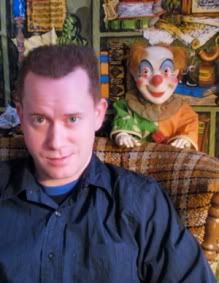 a critical sense, we noticed an extra amount of enthusiasm when talking to people about these first scares from their youth. Even the biggest horror cynic's eyes light up when discussing the first film that scared them. We all have a general knowledge of what horror films are considered classics but when it comes to talking about the films that actually scared us as children, the field is wide open and doesn't always include the usual suspects. I think finding and pointing out horror in unlikely places shows you just how limitless the genre really is. Ultimately, we just thought there were so many ways to approach the subject that were being ignored and we wanted to throw in our two cents, or more accurately our three dollar bills.
a critical sense, we noticed an extra amount of enthusiasm when talking to people about these first scares from their youth. Even the biggest horror cynic's eyes light up when discussing the first film that scared them. We all have a general knowledge of what horror films are considered classics but when it comes to talking about the films that actually scared us as children, the field is wide open and doesn't always include the usual suspects. I think finding and pointing out horror in unlikely places shows you just how limitless the genre really is. Ultimately, we just thought there were so many ways to approach the subject that were being ignored and we wanted to throw in our two cents, or more accurately our three dollar bills.
August Ragone: That was the demise of Henshin! Online. Once we broke up the band with my former website, I decided that I needed a forum that would be more hands-on; where I could publish my opinions and essays without the committee process that always held Henshin! Online back from achieving its mission statement. That original goal of Henshin! Online was to serve as a database of factual information on Japanese fantasy films and television productions, as well as to inform visitors on news and events without fear or prejudice. Unfortunately, even though we achieved some wonderful things with Henshin! Online, it eventually became nothing more than a corporate ass-kissing shill, and a gleaming spire of yellow journalism. So, I was very happy to see it come to an end.
John Morehead: As part of my graduate studies I came across various archetypal and mythic threads that surface in what scholars call the new religions, which includes things like Neo-Paganism and the Western esoteric tradition. The more I looked at this I also discovered these same elements surfacing in the genres of the fantastic. Powerful myths and archetypes make their way into the fantastic in popular culture, so my probing of these things brings together the two disciplines of great interest to me. I started posting my sporadic thoughts on these topics on an academic blog of mine devoted to cultural studies, and discovered a lot of interest and posted comments from people in the new religions, from scholars, from fans, and from the general public. I decided then to take the next step and create an entire blog devoted to an exploration of popular and academic aspects of the fantastic in pop culture. With this TheoFantastique was inspired and born.
Mike Petrucelli: BILLY LOVES STU was created on a whim (though I have been blogging since 2004 over at my main blog, PAX ROMANO'S RAMBLINGS). I had been watching George A. Romero’s Dawn of the Dead, and it hit me that the two military men, Roger and Peter, could be seen as a gay couple. They seem devoted to each other to the point of exclusivity and when one of them dies; the other becomes so depressed that he contemplates killing himself. Considering that Romero had an out gay character in Knightriders, I thought that this might have been his subtle way of throwing some of us a bone. Then again, I am seeing the movie and the relationship through my eyes, so I suppose it is all rather subjective. The second posting I did on BILLY LOVES STU was called, “Love in the time of Zombies: Peter and Roger”.
Dark Scribe: What’s the most popular feature of your blog?
John Cozzoli: From the attention and kindness of strangers I’ve received, I would say it’s the way I merge fiction with a review or interview, and treat both with the critical respect they deserve—even though I take some zany liberties doing so. I remember one blog I came across that was a 1 to 4 beer review, sparsely written style, which summed up everything in either “I liked it” or “I hated it” simplicity. No analysis, no deep thought, no well of experience to draw upon, nada. I swore I would do a whole lot better than that. I don’t think it behooves us fans of horror to treat someone else’s creative work so poorly and make snap judgments.
So a ZOMBOS CLOSET OF HORROR reader can expect two things, and often comes back because of them; the first one, as often as I can do it, is an off the wall slice of life with Zombos, his wife Zimba, me – I mean – ILoz Zoc, Chef Machiavelli (remember Mad Monster Party?), Pretorius the groundskeeper, Steve Brown, UPS Driver and World Adventurer, and whatever else suits my fancy to dream up. Second is a review or interview I devote my full attention to, as much attention as I devote to the fictional bit. Even if I hate a film or book or what have you, if I can have fun reviewing it, I’ll toss it into the mix. It seems to be working: I no longer ask for interviews or review copies. I am now quite buried under a pile of unsolicited material to the point I wish I could blog all the time to be timely in posting.
Stacie Ponder: People really seem to dig “Awesome Movie Poster Friday”, which constantly surprises me. I just find a bunch of movie posters that are related somehow (by filmmaker or theme, say) and I post ‘em! There’s also a good amount of participation in the Final Girl Film Club, so I suppose it’s fairly popular also.
Lance Vaughan: Our bread and butter is the "traumafession" where readers and writers other than ourselves share their stories of being scared as kids. There is definitely a very therapeutic quality in sharing these tales with others and knowing you were not alone when you thought you were. It's amazing the side discussions that pop up and the way one subject might inspire the next.
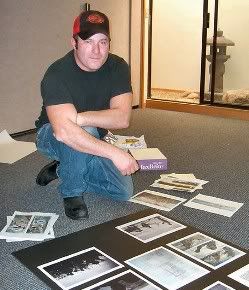 August Ragone: So far, I’ve received a lot of positive response for my essays on Toho’s original genre films, such as The H-Man (1958) and Battle in Outer Space (1959), as well as the new “The Monster of the Week” feature. “The Monster of the Week” aims to showcase a different beastie from a Japanese television series or film—and they are not your usual suspects, either — complete with biographical stats! We’ll see what the future holds in expanding with more features — but, that’s the beauty of blogging, isn’t it? The possibilities are endless.
August Ragone: So far, I’ve received a lot of positive response for my essays on Toho’s original genre films, such as The H-Man (1958) and Battle in Outer Space (1959), as well as the new “The Monster of the Week” feature. “The Monster of the Week” aims to showcase a different beastie from a Japanese television series or film—and they are not your usual suspects, either — complete with biographical stats! We’ll see what the future holds in expanding with more features — but, that’s the beauty of blogging, isn’t it? The possibilities are endless.
John Morehead: I don’t know that there is a particular “most popular feature.” I am surprised at times at what prompts people to post comments, and what results in readership spikes. Sometimes it’s not what I expect! I think there are many people out there like me who not only want to enjoy the fantastic as an escape or as entertainment, but also recognize that these are complex and multifaceted genres that have a lot to say to us and about us. I am pleased when I find these things resonate with readers, and find my site linked on other sites for whatever reasons.
Mike Petrucelli: Anytime I run a picture of a bare chest, I seem to get a lot of hits. Beefcake sells, baby!
Dark Scribe: How many unique visitors frequent your blog monthly? How did you build your audience?
John Cozzoli: (Sound of Pringle’s potato chip can opening, but worms pour out instead of chips. Switfh! ) I’ve got a few issues with answering this question, so bear with me. First, the easy answer is “more than a thousand.” My stock answer used to be “more than a hundred,” but I’ve grown a bit since then, so now it’s “more than a thousand.” Now the longer answer.
ZOMBOS CLOET OF HORROR is not a commercial blogsite. I don’t make any money from my reviews or when I highlight an author’s book, etc. That Amazon.com list of books in my right column contains selections I enjoyed reading and think others would, too. Not being a commercially-driven blog, I don’t care about hits: I care about readers. Hits and readers don’t necessarily equate, so to ask about hits, even unique ones, doesn’t say much about the readership of a blog. Hits are a stratagem evolved for click-pay commercially driven websites.
How I built and continue to build my readership ties into this. When I first started, my goal, like everyone else’s, my mantra – the mantra of most websites – was hits, hits, I must get more hits. Pretty soon it occurred to me I really did not want hits, I wanted readers, so I started adding RSS feeds and posting simultaneously to Blogcritics, Zimbio, Now Public, and other venues; so any one of my posts could have the potential to be read by hundreds, if not thousands, of readers. And my more mainstream reviews, like my Iron Man review on Now Public, which made their front page in the number one spot due to its popularity, receive the most benefit from this greater accessibility to be read. Exposure became my mantra, not enclosure. Posting to a multitude of online locations assured a review or interview would get the most visibility — the most readership. I built my audience, and continue to build it, by not worrying about hits to my blogsite: I worry more about how many readers I can get involved with my writing wherever they may be, especially when it involves an interview or review of a book I want to promote because it is worth promoting.
The key part of my approach here is my focus on providing more mainstream access to what is typically not mainstream reading material. Let’s face it, horror blogs, even the exceptional ones written by the members of LOTT D, fall into a small niche. Not everyone’s cup of tana tea is horror. If you stick to the conventional wisdom, that you must bring readers to your blog instead of bringing your posts to readers, wherever they may be, you will not tap into a larger audience that, normally, doesn’t think about horror or go searching for it down to the horror blog level.
I stopped using Sitemeter and Google Analytics when I realized this, and now I really don’t pay much attention to direct hits to my blog, except for reviewing the Stats section in Typepad to see where hits are coming from — a possible new avenue to post, perhaps, to involve new readers. By using this strategy, I’ve grown my readership by leaps and bounds. I am pleasantly surprised by the emails I receive from fans all over the globe who enjoy what I do. I doubt I would have reached them if I only worried about my own site’s hit rate and remained blog-centric instead of post-centric.
One last thing. Most bloggers are not yet taking advantage of social nets embodied by websites like Twitter and Facebook. I started posting mini-reviews on Twitter, then linked my full reviews to Twitter, so each time I post on my blog, a link is broadcast on Twitter. Ditto for Facebook. I now receive hits from those venues, and I’m reaching a greater audience through them.
Stacie Ponder: I average about 30,000 uniques per month. I have no idea if that’s good or bad in the 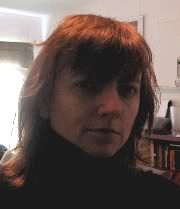 scheme of things, but I think it’s swell considering I don’t do any sort of promotion, really, or advertising. I think I owe it to two factors: my own participation in online communities (including commenting on other blogs) and simple word of mouth. I’ve been very fortunate in that FINAL GIRL has been mentioned in some wonderful publications and on some large websites — usually I find out about it after the fact. It’s really through the work of other people saying “Hey, check out this website” that I get new visitors…I’m just thankful and constantly amazed that anyone’s reading it at all.
scheme of things, but I think it’s swell considering I don’t do any sort of promotion, really, or advertising. I think I owe it to two factors: my own participation in online communities (including commenting on other blogs) and simple word of mouth. I’ve been very fortunate in that FINAL GIRL has been mentioned in some wonderful publications and on some large websites — usually I find out about it after the fact. It’s really through the work of other people saying “Hey, check out this website” that I get new visitors…I’m just thankful and constantly amazed that anyone’s reading it at all.
Lance Vaughan: We can count on about 20,000 a month and much more if there's a holiday around the corner. I think we were able to build our audience by being open to them. We like to think that the readers steer the ship and we just shovel the coal. Somehow we were lucky enough to attract some real loyalty and I gotta say, it's our readers that keep us going. I think because of them there is always something new to discover and you're not just locked into mine and Aunt John's personal views.
August Ragone: I haven’t really paid too much attention to that — beyond the “Geiger counter” on the page. Several blogs have linked to me, and I have posted links to stories of interest on several prominent message boards, including Mobius Home Video Forum and Classic Horror Film Board. I’m confident that joining the LOTTD has also helped. I’ve also gotten some good word of mouth, and I’m looking forward to keeping this going for the long haul.
John Morehead: I must admit I don’t track the unique visitors aspect of my site’s traffic. I do keep an eye on daily traffic with an eye toward subject matter that may be most appealing. As to building an audience, I have yet to reach the numbers I would like in fact I think my site might be one of the best unread secrets of the blogosphere on the fantastic! But despite my present number of readers, and my desires to reach a broader audience, my priority is to touch on topics that are of interest to me in my own journey of exploration. That they resonate with others is icing on the cake regardless of the numbers.
Mike Petrucelli: Believe it or not, I am not one of those people who check his stats, so I could not answer that question. Any audience I might have is because some of the more prolific bloggers (ARBOGAST ON FILM, MY NEW PLAID PANTS, SLASHER SPEAK) linked to something I posted.
Dark Scribe: What is it about the medium of blogging that attracted you and keeps you blogging?
John Cozzoli: There are a few things about blogging that attracted me: I was attracted to the simplicity of it. No matter what level of expertise you approach it with – and I’ve worked in the computer and technology field since the ‘80s – you can start blogging immediately; and for free, if you go with Blogger or some of the other free blogging sites. Then there is the format; it provides a neat way for you to write about anything that interests you, and hopefully others, too, in a timely and easy way. Look at all the newsy bloggers out there, texting in their posts by cell phone and what not, for example. So the way blogging is structured, it provides a low-intensity learning curve that can get you writing in a very short amount of time, on just about any topic you care to write about, as often as you care to without being a webmaster to do it.
The biggest attraction for me was the opportunity to write and have what I write – good or bad, unfortunately – be seen by readers immediately. I was not learning my craft in a vacuum, like I did when I first started writing. With my blog I could get feedback that would help me be a better writer. Feedback that would also, maybe, keep me motivated to write.
One other aspect that keeps me blogging is its potential for being so much more than just news, reviews, and quickie bits of verbiage. It is an incredible medium for the amateur writer. Like the fanzines produced in the more low-tech, slower-communication world of yesterday, blogs are our fanzines, our way to communicate our passion for something and share it with other fans and professionals. It provides a great way to showcase what-you-got, and shamelessly draw attention to you.
Stacie Ponder: I love the versatility and the ease of it, as I’m a total computard. The idea of maintaining an actual website and all that would entail seems daunting to me; I use Blogger, though, and I can upload text, video, images, or whatever because they make it simple for doofuses like me. I also love the community that blogging seems to foster; regular commenters become people I know. I dig the feedback and the conversation it engenders.
Lance Vaughan: The possibilities with blogging are infinite. You can incorporate anything you have a mind to and the reaction is immediate and potentially worldwide. What's not to love?
August Ragone: The freedom is paramount, as opposed to the restrictive nature of a website, allowing me ability to feature a rare photograph without having to write an entire article around it. Some might find that lazy, but there’s that old saying about a picture and 1,000 words… It’s a nice sense of versatility with plenty of elbowroom do as much or as little as you want, to write incessantly or make a statement with only an image.
 John Morehead: I reluctantly entered the blogosphere. A friend and colleague encouraged me to jump in, but I really didn’t think I’d have much to say, or at least not much that was significant. As readers can see, I got over these feelings! My philosophy for my writing and posting is that I’ve got to have something significant and meaningful to say about my subject matter otherwise I won’t write. I really don’t care for the more mundane sites that list what a person may be listening to on their iPod, or what they had for lunch. What attracts me are thoughtful and reflective posts on the Internet that make me think or touch me emotionally about subject matter that I am interested in. I am attracted to blogging as a forum whereby I as a creative person can stretch my own intellect and imagination and do so with and for others.
John Morehead: I reluctantly entered the blogosphere. A friend and colleague encouraged me to jump in, but I really didn’t think I’d have much to say, or at least not much that was significant. As readers can see, I got over these feelings! My philosophy for my writing and posting is that I’ve got to have something significant and meaningful to say about my subject matter otherwise I won’t write. I really don’t care for the more mundane sites that list what a person may be listening to on their iPod, or what they had for lunch. What attracts me are thoughtful and reflective posts on the Internet that make me think or touch me emotionally about subject matter that I am interested in. I am attracted to blogging as a forum whereby I as a creative person can stretch my own intellect and imagination and do so with and for others.
Mike Petrucelli: When I started PAX ROMANO’S RAMBLINGS back in 2004, I just wanted a place where I could bitch and moan about politics and whatever was on my mind. It is still my main reason for blogging. It can be very cathartic.
Dark Scribe: Is there an art to blogging? Do you think blogging is – or will eventually become – a legitimate form of professional writing? Or will it remain a hobbyist’s domain?
John Cozzoli: It has already become a legitimate form of writing. Look at David Wellington’s initial blog-novels, or Scott Adams’ Dilbert blog, or Underland Press’s wovel, or a gazillion other blogs, bloglikes, and blog-enhanced websites. Many amateur and professional writers are blogging, and many amateur blogs are top-notch when it comes to professionally written reviews and views. Then there is the most prominent use of blogging — for news and promotion. Authors and small to large press publishers use blogs to connect with their readers and keep them informed. I don’t believe you can say that blogging was ever a hobbyist’s domain. Right from the start it became the best, flexible medium for expression, digression, impression, and obsession for fans, professionals, and commercially-oriented gurus to exploit.
I’m not sure I would say there is an art to blogging. I would rather say there is a craft to it, and you need to learn what works best for you. Now, I would say that blogging is an art form. What is art? Lots of definitions here, but if you scale it down to its basic elements, art is human expression directed toward creating an emotional state of contentedness, transcendent beauty, or timelessness in the viewer. Art seeks to wake you up, purr on your shoulder, and make you feel hot cocoa comfy inside. Conversely, art has a darker side, too. This darker side is just as valid, but it strives to make you feel loss, inadequacy, or frisson. The darker side of art also wants to wake you up, but it growls on your shoulder and makes you feel Southern Comfort on the rocks cold. All of these sensations can, potentially, be elicited by the craft of blogging.
Stacie Ponder: I think there’s definitely an art to blogging, in that you need a strong voice to hook people. Anyone and everyone are writing reviews of this movie and that movie — why should anyone bother to read your blog about it? You’ve got to have something that makes your effort singular…what that means in concrete terms, though, I have no clue. I think blogging is becoming more legit- most every website has some sort of blog content nowadays, or bloggers run advertising on their pages. I think blogs just need to be judged (if they need to be judged at all) on an individual basis. The internet allows everyone to have his or her say; sure, there are plenty of blogs that don’t amount to much more than “This movie was wicked cool! LOL”, but you’ll also find some fantastic writing out there by amateur and “slumming” pros alike. It’s not fair to dismiss and entire medium simply because it’s not…I don’t know, paper-based.
Lance Vaughan: I think of a hobby as collecting or assembling something that somebody else has created. Anytime you create something that did not exist before, in my opinion, you are making art. When people talk down about blogging it's usually because they are resentful of the even playing field it provides. You don't have to know anybody or have gone to a certain school to participate. What happens is people end up gravitating toward what they actually like instead of what they are told to like and that's a scary thought for some people. As far as acceptance goes, who needs it? I mean, there are many who do not accept the horror genre in general as legitimate and I think we all know that those particular people are insane.
August Ragone: Art? Well, first and foremost, you should be informative and fun; or why bother? And as much as there is bashing out there towards blogs by “legitimate” writers, and as much as much chafe you have to glean through to find the wheat, there is some great writing and chronicling going on out there – I’ve read some incredible stuff – some of it is pretty hysterical, too (intentionally and unintentionally). Blogging is the ultimate in Freedom of the Press (or at least the closest thing to it)!
John Morehead: This is a tough one, and others may disagree with me here. Given the glut of blogs out there, many of them not worth reading in my view, blogging may not rise to a level of great significance as in other writing venues, taken as a whole. In fact, I’ve struggled with maintaining my site as a blog, and in recent months have tried to format it more as a website. For some reason websites are taken more seriously than blogs. But this is not always the case. In politics, for example, several blogs have become very influential, and have even become part of the social discourse surrounding the political process itself. My hope for writers like myself is that the quality of our blogging might be taken seriously as commentary and academic work on the fantastic that compliments more traditional expressions in magazines, journals, and books. Hopefully the venue for my writing does not detract from its seriousness or quality as an art form and intellectual construct.
Mike Petrucelli: An art? I suppose some might find it that way. I think blogging, in general, brings out the 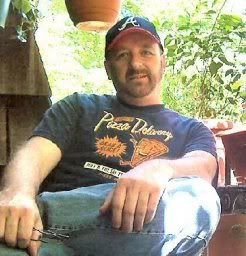 best and worst in people. I have read some of the most profound and thought provoking things on blogs, and, conversely, I have read some of the most hateful, ludicrous rants on others. But that’s the way it should be. Not everyone gets to write for a paper or a magazine; blogging is the electronic soap box that everyone gets to step up on and let their voices be heard. I hope it remains a hobbyist’s domain; I’d hate to see it replace legitimate publications.
best and worst in people. I have read some of the most profound and thought provoking things on blogs, and, conversely, I have read some of the most hateful, ludicrous rants on others. But that’s the way it should be. Not everyone gets to write for a paper or a magazine; blogging is the electronic soap box that everyone gets to step up on and let their voices be heard. I hope it remains a hobbyist’s domain; I’d hate to see it replace legitimate publications.
Dark Scribe: How has being part of a consortium of horror bloggers like LOTT D enhanced your individual blog?
John Cozzoli: First, of course, there is this sense of belonging to a group of bloggers who are passionate about what they do. Their blogs are windows into their horror-is-fun-filled souls and they sustain a high level of professionalism in blogging about horror because of it. This level of professionalism provides a friendly competition sensibility for me, so I strive to keep up with them.
The other aspect of LOTT D that has benefitted me greatly is getting a well-rounded view of the horror sub-genres from the group. I’m fairly knowledgeable when it comes to horror movies in general, but being part of LOTT D has deepened my level of understanding to so much I hadn’t explored. We have a pretty diverse group, and I’ve benefitted from their collective experiences and viewpoints, which help me write better reviews and conduct better interviews because I have a broader perspective, fostered by them, to draw on. In horror especially, no blogger is an island.
On the purely mechanical side of it, I’ve seen how members design their blog, write a post, or how they use graphics or a nifty new something I had not seen before. So I rip it off pronto and…bam!...my blog looks super. Thanks guys!
Stacie Ponder: Honestly, I don’t use LOTTD to its fullest advantage, and I’m sure FINAL GIRL is suffering for it. I will say, however, that it’s introduced me to a slew of horror blogs that I’ve become a big fan of…so at least, everyone else gaining a reader makes up for my lameness!
Lance Vaughan: LOTT D has been a godsend. Besides introducing KINDERTRAUMA to many people who would otherwise not come across it, through LOTT D I've discovered some sites that I may have missed myself. Many of them I visit everyday now and I just really enjoy having easy access to so many divergent opinions on horror. I think if the genre is ever to receive the proper respect it deserves, people and especially fans have to open up their minds to just how expansive and mutable it is and LOTT D is a great place to start.
August Ragone: I was honored in being asked to join; it’s a nice sense of recognition and affirmation. So, at this point, it’s been mostly personal. But, it’s also great to be in the company of some of the coolest bloggers out there in our little creepy niche—so I don’t know why they picked me! (laughs) Hopefully, this will lead to a career where I can retire to marry a tattooed lady and build hot rods. Until then, I’ll be drinking Tana Tea with my fellow monsters.
John Morehead: When I first received the invitation to be part of LOTT D I was both surprised and humbled. I had read several of the blogs and website that were part of its fledgling status, and enjoyed them immensely. That I would be given an invitation to join them as somehow a special collection of good writing and thinking on horror has been a real honor. I think being part of this has given my site additional credibility, a sense of community with my fellow LOTT D members, expanded my readership, and has also given us a broader voice than we may have had as individual writers. My thanks to John of ZOMBOS CLOSET OF HORROR for the invitation and experience! I would also like to once again thank Dark Scribe Magazine for producing a fine online magazine, and for this opportunity to talk about my work.
Mike Petrucelli: Groucho Marx once said, "I would never want to belong to any club that would have someone like me for a member.” Thank heavens LOTTD changed my mind. I am honored to be in such esteemed company.
For a complete list of the LOTT D member blogs, visit the group's homepage.
Special thanks to the LOTT D members who participated in this roundtable discussion:
- Zombos Closet of Horror
- Final Girl
- Kindertrauma
- The Good, The Bad, And Godzilla
- TheoFantastique
- Billy Loves Stu
Revealing the Secret Minds of Editors
By, Derek Clendening
Knowing an editor’s needs is crucial to any writer’s survival; understanding those needs even more so. Today, many novelists sell short fiction to make ends meet and must satisfy ever-changing market demands. Sure, this allows their faithful readers to consume additional frights – bite-sized scares if you will – in between novels. But genre magazines and anthologies can be considered a niche market, and even seasoned writers cannot read an editor’s mind. Recently, Dark Scribe Magazine caught up with three of the savviest, most well-respected editors working in the dark genre field today to ask how the short fiction scene has changed, how they do business, and how they help to cultivate up and coming writers.
Our panel…
Since 1967, Mort Castle has published more than six hundred pieces, and more than ten books. He’s a workshop mentor, a writing teacher and, if you need a drinking companion, you could do a lot worse. Currently the editor of Doorways, he will be offering his unique fashion of writing instruction at Borderlands Boot Camp this summer.
Peter Straub once referred to Ellen Datlow as America’s horror anthology queen, and for good reason. After seventeen years as editor of Omni, Ellen’s name has become synonymous with the horror anthology. She edits The Year’s Best Fantasy and Horror, with Terri Windling (St. Martins), and has produced recent theme anthologies from Tor, including The Dark and Inferno. Forthcoming from this award-winning editor is a children’s fairy tale anthology, also edited with Terri Windling, titled Troll’s Eye View (Viking), and Poe: 19 New Tales of Suspense, Dark Fantasy and Horror inspired by Edgar Allan Poe (Solaris).
Nick Mamatas is a jack-of-all-trades: he’s a writer, an editor, a writing teacher, and a purveyor of rapier wit. He is the editor of Clarkesworld Magazine, and the author of Stoker award nominated Move Underground. Forthcoming from Nick are You Might Sleep… and Haunted Legends (Tor), co-edited with Ellen Datlow.
Dark Scribe: How would you summarize the current state of the short horror fiction market? Do you see any differences between current magazine and anthology markets in terms of short horror fiction?
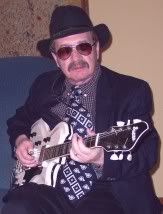 Mort Castle: There are probably more opportunities to publish short horror fiction than we’ve ever had - if you accept every java-rich/content dismal website and every attitude/100, grammar/14 Kinko’s Xerox-o-zine as a publishing opportunity. But, horror short stories have been appearing in venues in which we wouldn’t have found them 40 years ago: serious mainstream mass market magazines like The Atlantic’s special fiction issue, The New Yorker, and major literary magazines like Tin House and Zeotrope/All Story. Mainstream magazines, too, are more open to horror than once was the case; plenty of stories we find in EQMM and Hitchcock’s Mystery Magazine could easily be called horror. Then we have the old reliable Cemetery Dance, and the sometimes reliable and definitely old Weird Tales, and the new reliable Doorways.
Mort Castle: There are probably more opportunities to publish short horror fiction than we’ve ever had - if you accept every java-rich/content dismal website and every attitude/100, grammar/14 Kinko’s Xerox-o-zine as a publishing opportunity. But, horror short stories have been appearing in venues in which we wouldn’t have found them 40 years ago: serious mainstream mass market magazines like The Atlantic’s special fiction issue, The New Yorker, and major literary magazines like Tin House and Zeotrope/All Story. Mainstream magazines, too, are more open to horror than once was the case; plenty of stories we find in EQMM and Hitchcock’s Mystery Magazine could easily be called horror. Then we have the old reliable Cemetery Dance, and the sometimes reliable and definitely old Weird Tales, and the new reliable Doorways.
The anthology field is what it has always been, except the cyber-thing has happened here, too, via POD, and a number of so called books offering royalty payments “payable upon proof of Jesus’ return”; but Marty Greenburg and Co. continue to produce real anthologies, so do many of the older and newer specialty presses, etc.
Tell you this . . . as an editor for Doorways, I see plenty of stories that were obviously rejected by theme anthologies. Sure makes me eager to snap ‘em right up, yes sir.
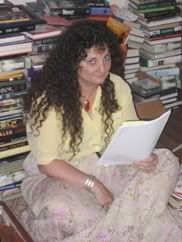 Ellen Datlow: We’re in a golden age of short horror fiction. There’s incredible stuff being published all over and the horror reader needs to be more aware of what’s out there. The magazines and anthologies I read are often mix-genre, and many have horror in them. They’re not just fantasy and they’re not just horror. The horror reader who only reads Cemetery Dance or City Slab isn’t going to know that there’s good horror fiction in Fantasy and Science Fiction. And they’ve always had horror.
Ellen Datlow: We’re in a golden age of short horror fiction. There’s incredible stuff being published all over and the horror reader needs to be more aware of what’s out there. The magazines and anthologies I read are often mix-genre, and many have horror in them. They’re not just fantasy and they’re not just horror. The horror reader who only reads Cemetery Dance or City Slab isn’t going to know that there’s good horror fiction in Fantasy and Science Fiction. And they’ve always had horror.
There have never been that many markets dedicated to horror stories, but many other existing markets have horror in them. The reader just has to be aware of what’s out there.
Nick Mamatas: Like the rest of the publishing trade, it’s slowly but surely moving online. The best-paying markets for horror are Clarkesworld (10 cents per word) and ChiZine (7 cents per word). Ultimately, the upper bound for audience is a function of circulation. If Weird Tales, for example, prints 5000 copies and sells 80% of them, and if each of those magazines gets passed around to two other people (on average), the largest potential audience for the stories (and ads) within is around 12, 000. The largest potential audience of an Internet publication is much larger, and we are now seeing consistent 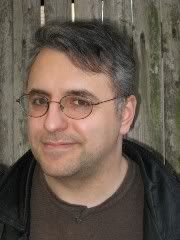 monetization of the Internet as well - ads finally work to a certain extent, as do “tip cups”, using an electronic platform to sell print anthologies and branded merchandise, etc. To a certain extent, this is even true in the print world. Cemetery Dance magazine in many ways serves as a catalog with content for Cemetery Dance’s book division.
monetization of the Internet as well - ads finally work to a certain extent, as do “tip cups”, using an electronic platform to sell print anthologies and branded merchandise, etc. To a certain extent, this is even true in the print world. Cemetery Dance magazine in many ways serves as a catalog with content for Cemetery Dance’s book division.
The major obstacle is one of competence - anyone competent enough to create an amazing online horror fiction periodical is also competent enough to realize that such efforts would probably be better spent on some more popular kind of content, to increase return on investment. So the market is dominated by idealists (a good thing) and by the semi-competent (not so much).
Anthologies are different altogether. The trick there is to make sure the stories don’t have an expiration date, at least if one wants a perennial backlist seller. Well, good luck with that!
Dark Scribe: What do you feel the horror short story offers a reader that the horror novel doesn’t?
Mort Castle: Simple: Intensity. You can maintain intensity for the length of a short story.
It’s the rare book that can do that. Oh, sometimes pace will give the feeling of intensity, but . . . . Well, motion is not weight, okay.
This is why King’s Pet Semetary is a masterwork. He’s got over a 100-page intensity stretch in that one book. Klein comes pretty close in The Ceremonies, with its mightily claustrophobic tension.
But I don’t know that anyone can maintain intensity for 500 pages.
Ellen Datlow: You can read it in one sitting, and you can read it while you’re on the bus or on the train. There’s also a short, sharp shock, but I don’t like that. I prefer my stories to have more of an aftertaste. A short story creates a whole world in a short space and a compressed fashion. A lot of novels could have been short stories or novellas. Sometimes the writers overindulge themselves.
Nick Mamatas: The horror short story actually offers horror. Back before the bean counters took over the book trade and mandated 90, 000-word novels for reasons having nothing at all to do with aesthetics, and everything to do with the costs of shipping and paper, novels could be horrific experiences as well. Now, the horror novel essentially doesn’t exist. There are thriller novels with horrific episodes, crime novels with the same, adventure and SF novels, even with literary and romance novels with moments of horror. Novels are unwieldy and flabby--most would be perfectly wonderful at 40 or 50, 000 words, but have entire subplots and ridiculous asides that serve no purpose to the reading experience.
Horror is the kind of thing that really benefits from being consumed in a single sitting.
Dark Scribe: Many of the dark genre labels – horror, suspense, and thriller – are used interchangeably in today’s market. Where do you think true boundaries exist that separate one from the other?
Mort Castle: I don’t think there are boundaries, true or otherwise. Boundaries are determined by genre - and genre is determined not so much by a set of conventions but by a marketing department. “Hey, westerns aren’t selling – so now, Ed Gorman is a writer of “Historical Fiction” - and horror isn’t selling, so now we are talking “supernatural thriller of the non-epistolary transgenerative mode.”
Or - the man wants a blue suit, so turn on the blue light.
Ellen Datlow : There are no true boundaries - it’s all in degree and perception of the reader. Can you say that the suspense/mystery classics Red Dragon and The Silence of the Lambs are not horror? I certainly can’t. I just read Chelsea Cain’s serial killer novel Heartsick. It’s a very horrific mystery/suspense novel that delves deep into the darkness of humanity. Isn’t that what “horror” does? I don’t see any point in worrying about the labels.
Nick Mamatas : Horror is a tonal element. You can have a horrific thriller, horrific SF, horrific realism, etc. In that way, it is much like romance, which can exist in any settings or alongside any plot. So, horror is qualitatively different than crime fiction, which is concerned with - surprise! - crime. Horror fiction is concerned with any number of plots or setting, but that pokes at the reader’s subconscious in a way that causes fright, dread, or distress. Of course, one reader’s fright is another reader’s chuckle, so we may as well just stack the books anywhere and hope for the best.
Dark Scribe : Many anthologies are done by invite only, and magazines tend to have open submission calls. There are so many great writers out there - how do you choose which writers to work with?
Mort Castle : There are so many great writers out there - yeah, you nailed that. And the wonderfully great majority of ‘em are first class human beings.
So that means no editor has to work with jerks. “Oh, you met me at a convention, spent 20 minutes ranting at me that you were the new hot blood cold stone killer in the horror community so us old guys had better get out of way, grwahhh-wahr, and then, after another few drinks you threw up on my shoes . . . .”
Don’t bother to send me a story. If I am editing an anthology, you need not keep your cell phone on awaiting my invitation.
You choose writers by . . . A) Can you deliver the goods? B) Can you conduct yourself in a professional manner - meeting deadlines, accepting the editor’s privilege of actually editing, etc.? C) Will you not be a major pain in the extreme lower neck?
Ellen Datlow : I choose from the wide range of people I’ve published in magazines. I’ve asked Joyce Carol Oates to write stories for me, because I’ve bought work of hers for Omni. I published a lot of mainstream writers at Omni, but Joyce is the only one I regularly ask for stories. But I have been in touch with enough writers, who I have worked with or want to work with, and I can pick and choose from them.
Nick Mamatas : A combination of factors - who will do the work (depending on the theme) well, and meet deadlines, and be a pleasure to work with. Those are the main ones. People spend a lot of time talking about the “big names”, but really there are only a few people who qualify as “big names” who can sell books just by being on the cover. Most so-called “big names” are just well-regarded midlist writers, people who make about as much money writing as any recent college grad in some other field. However, they will, you guessed it, do the work, do it on time, and who won’t flip out over editorial comments.



